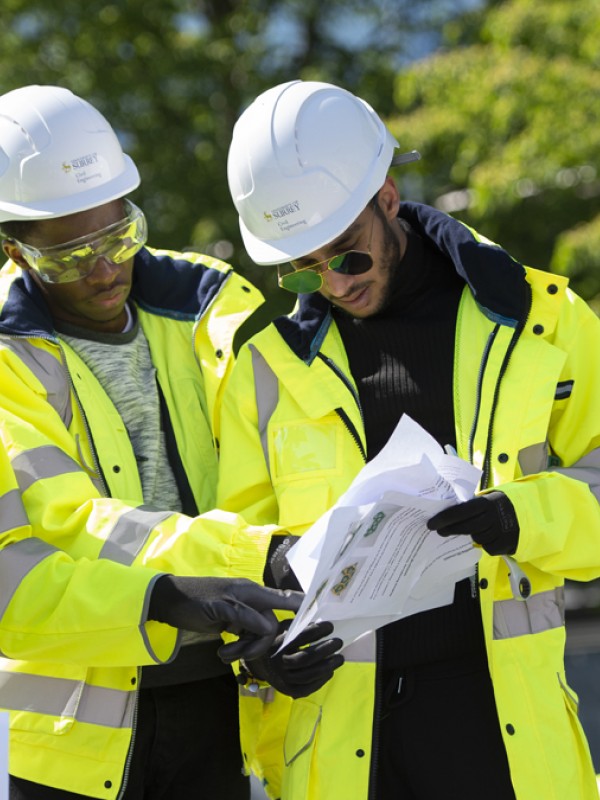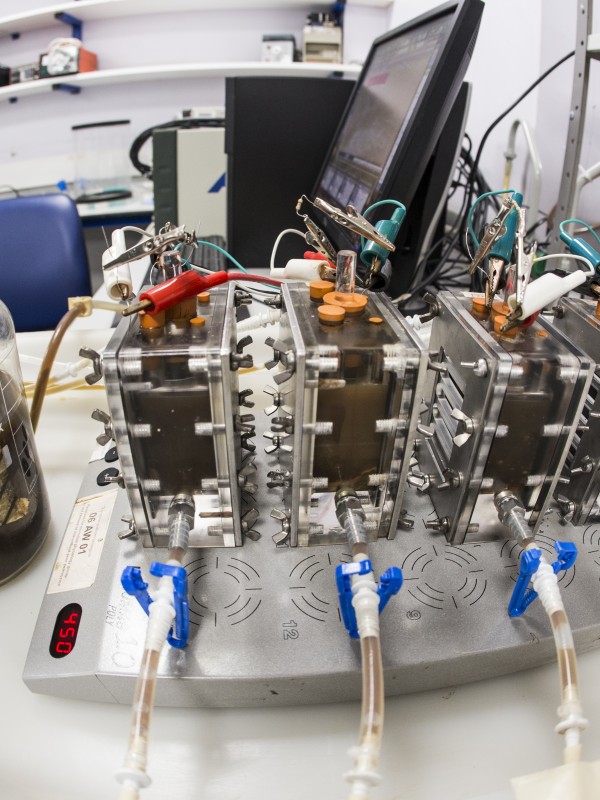
- Water and Environmental Engineering
MSc — 2025 entry Water and Environmental Engineering
Our Water and Environmental Engineering MSc degree equips students with the knowledge and skills needed to address pressing challenges related to water resources and environmental sustainability.
Why choose
this course?
There’s a global shortage of qualified professionals who specialise in water and environmental engineering. Our MSc will transform you into an expert on water and environmental sustainability, ready to tackle the industry’s complex challenges.
This fully accredited course is taught by experts from our Centre for Environmental Health and Engineering (CEHE), which is a designated World Health Organization Collaborating Centre for the protection of water quality and human health. CEHE sits within the School of Sustainability, Civil and Environmental Engineering.
Our course is increasingly popular and relevant to the needs of future engineers, scientists and professionals in sectors such as environmental health, water quality, sanitation, water resource management and pollution control.
Accreditation






What you will study
Our MSc attracts UK and international graduates who wish to take advantage of the global interest in water quality, sanitation and integrated water resources management to develop their careers.
It will provide you with a solid understanding of the core areas of water and environmental engineering. You’ll gain the skills you need to explore, critically assess and produce systematic and coherent solutions for sustainable water and environmental management.
You’ll do this while integrating core engineering science with practical applications, both independently and within a team, developing an understanding of how this knowledge can be articulated around sustainable development practices.
We’ll prepare you for a successful career in the field, including, where appropriate, progression to Chartered Engineer status.
Professional recognition
MSc - European Accreditation of Engineering Programmes (EUR-ACE)
This Programme is accredited by the European Accreditation of Engineering Programmes (EUR-ACE)
MSc - Joint Board of Moderators (JBM)
This degree is accredited by the Joint Board of Moderators (JBM) comprising of the Institution of Civil Engineers, Institution of Structural Engineers, Institute of Highway Engineers, the Chartered Institution of Highways and Transportation and the Permanent Way Institution on behalf of the Engineering Council as meeting the academic requirement for Further Learning for registration as a Chartered Engineer (CEng). To hold accredited qualifications for CEng registration, candidates must also hold a Bachelor (Hons) degree that has been accredited as partially meeting the academic requirement for registration as a Chartered Engineer (CEng) See www.jbm.org.uk for further information.
*It should be noted that candidates completing the MSc who hold an underpinning accredited Bachelor degree accredited for IEng only or a non-accredited bachelor degree will need to apply for an academic assessment to determine whether they will meet the educational base for CEng registration.
Distance learning
Surrey is a pioneer in distance learning-based MSc courses in civil and environmental engineering. This flexible option allows you to study for our distinctive, accredited programme from anywhere in the world, without the need to relocate or give up your existing job.
As a distance learner, you’ll study eight modules and complete a dissertation in your chosen subject (like full-time and part-time students), but you can take up to five years to complete your masters. You’ll be able to access all module materials through our virtual learning environment, SurreyLearn, and arrange to take end-of-module exams remotely.
Learn more about distance learning programmes (PDF).
The structure of our programmes follows clear educational aims that are tailored to each programme. These are all outlined in the programme specifications which include further details such as the learning outcomes:
Modules
Modules listed are indicative, reflecting the information available at the time of publication. Modules are subject to teaching availability, student demand and/or class size caps.
The University operates a credit framework for all taught programmes based on a 15-credit tariff, meaning all modules are comprised of multiples of 15 credits, up to a maximum of 120 credits.
Course options
Year 1
Semester 1
Compulsory
This module is one of the core subjects which provides students with essential knowledge of water chemistry, drinking water treatment and supply. In this module students learn about conventional and advanced water treatment methods and related design principles. The lectures of this module are delivered by academics and water industry experts. On successful completion of the module, the students are able to show originality in the application of knowledge of water treatment to specific situations. The primary JBM threads for this module include: Design, Sustainability and Health and Safety Risk Management; and this module covers Professionalism and Ethics as contributory thread. It is normally expected that students have a background knowledge of applied chemistry and microbiology to the level of final year BSc, or have completed ENGM055 Applied Chemistry and Microbiology.
View full module detailsThe Sustainable Development Goals (SDGs) are applicable to both developed and developing nations. SDG 6 (to ensure availability and sustainable management of water and sanitation for all) addresses global challenges in relation to drinking water, notably the limited access to safe water and sanitation faced by billions of people around the world. Additional challenges include increasing pressures on water resources and ecosystems, disasters and the increased risk of droughts and floods due to climate change. This module, through lectures, case studies and class participation will address these issues in the context of water, sanitation, and public health. It will provide an understanding of how engineering can help achieve the overall aim of SDG 6, and its associated targets and indictors, by protecting public health through ensuring the availability and sustainable management of water and sanitation can be built. The module addresses the aim of the MSc in Water and Environmental Engineering to provide a comprehensive understanding of the core areas of water and environmental engineering in relation to the protection of human health. It will give the knowledge and skills needed to explore, critically assess, and evaluate problems associated with poor water and sanitation and produce systematic and coherent solutions to protect public health.
View full module detailsWastewater quality and treatment have major implications for public and environmental health and the urban water cycle. In this module we will explore this through a broad ranging overview of elements of wastewater treatment and sanitation systems, including the design approaches, sewerage systems and sustainable urban drainage system (SuDs). Major wastewater (sewage) treatment processes will be covered in detail, from the theoretical knowledge of applied microbiology to practical process design, with inputs from both academics and professionals working in the sector. Approaches to developing world sanitation and wastewater treatment processes will also be covered in the module, which provide in-depth technical knowledge related to topic in ENGM289 Global Challenges in Water and Health. On successful completion of the module, the students are able to show originality in the application of knowledge of sustainable sewerage systems and wastewater treatment to specific situations.
View full module detailsOptional
Infrastructure systems have become increasingly complex and interconnected which results in strong interdependencies between them. These systems may become fragile and subject to disruptions that can have significant consequences both in the local as well as national and global level. This module forms the foundation required for systems thinking in infrastructure by introducing the background required for modelling the interconnected nature of infrastructure systems and understanding the different types of interdependencies that exist between them. It also provides an overview of the different types of risks that need to be considered for assessing the resilience of infrastructure systems and discusses the different adaptation and mitigation options available for sustaining their continuous operation and preventing cascading failures.
View full module detailsThis module provides an overview of the management of infrastructure assets both at individual as well as network/system level. It introduces the concepts, theory and methods for infrastructure asset management through utilisation of a whole-life framework. It covers asset management frameworks, risk management and asset performance modelling towards the development of maintenance strategies for infrastructure assets. Case study examples from different infrastructure sectors are reviewed.
View full module detailsSemester 2
Compulsory
This is a compulsory module of the MSc in Water and Environmental Engineering. It is an optional module for the MEng programme in Civil Engineering and for the MS in Infrastructure Engineering. The module teaches theory and practice of numerical tools for the simulation of river hydraulics and urban drainage networks. These tools are essential for the planning and design of sustainable flood alleviation schemes in the civil engineering practice.
View full module detailsSpatial data — data tied to a specific geographical location or area — is ubiquitously available and provides rich insight into our natural and built environment, social and economic activities and much more. Geographical Information Science (GIS) provides the concepts, methods and tools to analyse such data, using the spatial component of the data as an integral part of the analysis. Remote Sensing (RS) systems image the entire Earth on daily basis. RS methods allow the derivation of a wide range of spatial information from the imagery, providing a major source of spatial data. GIS and RS are used in a wide range of disciplines including hydrology, natural resource management, climate change and infrastructure planning. This module introduces the theoretical foundations and trains the student in using these techniques to solve problems and support decision making, with an emphasis on Civil and Environmental Engineering practice.
View full module detailsInfrastructure systems play a crucial role towards sustainable development as they serve the needs of the society. An understanding of the three dimensions of sustainability, economic, environmental and social, is vital towards the planning, design and operation of sustainable infrastructure systems. This module evaluative frameworks that can capture economic, environmental and social constraints to understand the balance between these three dimensions towards the development of sustainable infrastructure projects. Particular focus is given to whole-life carbon accounting and life cycle assessment for assessing the environmental impact of infrastructure systems and multi-criteria decision analysis and environmental/social impact assessments, capable of capturing the three pillars of sustainability for holistic decision-making within the context of infrastructure.
View full module detailsNature Based Solutions (NBS) are defined by International Union for Conservation of Nature as actions to protect, sustainably manage, and restore natural or modified ecosystems, which address societal challenges (e.g., climate change, water security or natural disasters) effectively and adaptively, while simultaneously providing human well-being and biodiversity benefits. NBS are increasingly used as a more sustainable way of managing environments or environmental systems. NBS use nature¿s own resources (clean air, water, plants, and soil) to provide cost-effective environmental, social, and economic benefits and help build resilience. Such solutions bring more diverse nature and natural features and processes into existing networks and infrastructure systems including cities, landscapes, and coastal areas, through site specific, locally adapted, resource-efficient interventions. Engineers are working to restore natural buffering systems (e.g., wetlands and tree canopies), utilise green infrastructure, and better manage natural areas to restore riparian corridors, create resilient coastal ecosystems, manage flood risk, enhance water quality and waste treatment, improve air quality, mitigate climate change and more. NBS are often seen as an alternative, more sustainable solution to hard engineered infrastructure solution (by fulfilling multiple services and / by having fewer adverse characteristics). However, NBS cannot be unilaterally implemented due to prevailing characteristics of the built and natural environments. The module will provide the knowledge and skills needed to explore, critically assess, and evaluate the ¿why¿, ¿how¿ and utility of NBS to protect, manage and restore ecosystems vulnerable to societal and environmental challenges. An important part of the module will be to critically assess, compare, and determine the feasibility of different solutions drawn from literature and case studies where NBS have been successful implemented. .The module will draw on the desire of communities to live in green spaces and explore options for engineers to design and integrate facilities within ecosystems in a way that benefits ecological and human health. Due to the multidisciplinary nature of NBS, the module will explore different environments (air, water, coastal, rural, and urban) ensuring the interaction between different research disciplines such as coastal management, wastewater treatment, air quality, material and infrastructure, and urban management.
View full module detailsSemester 1 & 2
Compulsory
The module provides an opportunity for students to undertake guided, individual research into a topic related to their programme of study. Students are required to take independent ownership of their project and demonstrate this through their management of the available resources, including meetings with project supervisor(s), the timely acquisition of relevant information and experimental results. They must prepare and submit a formal, written, report to a specific deadline and subsequently present and defend their work at an oral examination.
View full module detailsOptional modules for Year 1 - FHEQ Level 7
Students must select one optional module from the listed available
Unstructured years
Semester 1
Compulsory
This module is one of the core subjects which provides students with essential knowledge of water chemistry, drinking water treatment and supply. In this module students learn about conventional and advanced water treatment methods and related design principles. The lectures of this module are delivered by academics and water industry experts. On successful completion of the module, the students are able to show originality in the application of knowledge of water treatment to specific situations. The primary JBM threads for this module include: Design, Sustainability and Health and Safety Risk Management; and this module covers Professionalism and Ethics as contributory thread. It is normally expected that students have a background knowledge of applied chemistry and microbiology to the level of final year BSc, or have completed ENGM055 Applied Chemistry and Microbiology.
View full module detailsThe Sustainable Development Goals (SDGs) are applicable to both developed and developing nations. SDG 6 (to ensure availability and sustainable management of water and sanitation for all) addresses global challenges in relation to drinking water, notably the limited access to safe water and sanitation faced by billions of people around the world. Additional challenges include increasing pressures on water resources and ecosystems, disasters and the increased risk of droughts and floods due to climate change. This module, through lectures, case studies and class participation will address these issues in the context of water, sanitation, and public health. It will provide an understanding of how engineering can help achieve the overall aim of SDG 6, and its associated targets and indictors, by protecting public health through ensuring the availability and sustainable management of water and sanitation can be built. The module addresses the aim of the MSc in Water and Environmental Engineering to provide a comprehensive understanding of the core areas of water and environmental engineering in relation to the protection of human health. It will give the knowledge and skills needed to explore, critically assess, and evaluate problems associated with poor water and sanitation and produce systematic and coherent solutions to protect public health.
View full module detailsWastewater quality and treatment have major implications for public and environmental health and the urban water cycle. In this module we will explore this through a broad ranging overview of elements of wastewater treatment and sanitation systems, including the design approaches, sewerage systems and sustainable urban drainage system (SuDs). Major wastewater (sewage) treatment processes will be covered in detail, from the theoretical knowledge of applied microbiology to practical process design, with inputs from both academics and professionals working in the sector. Approaches to developing world sanitation and wastewater treatment processes will also be covered in the module, which provide in-depth technical knowledge related to topic in ENGM289 Global Challenges in Water and Health. On successful completion of the module, the students are able to show originality in the application of knowledge of sustainable sewerage systems and wastewater treatment to specific situations.
View full module detailsOptional
Infrastructure systems have become increasingly complex and interconnected which results in strong interdependencies between them. These systems may become fragile and subject to disruptions that can have significant consequences both in the local as well as national and global level. This module forms the foundation required for systems thinking in infrastructure by introducing the background required for modelling the interconnected nature of infrastructure systems and understanding the different types of interdependencies that exist between them. It also provides an overview of the different types of risks that need to be considered for assessing the resilience of infrastructure systems and discusses the different adaptation and mitigation options available for sustaining their continuous operation and preventing cascading failures.
View full module detailsThis module provides an overview of the management of infrastructure assets both at individual as well as network/system level. It introduces the concepts, theory and methods for infrastructure asset management through utilisation of a whole-life framework. It covers asset management frameworks, risk management and asset performance modelling towards the development of maintenance strategies for infrastructure assets. Case study examples from different infrastructure sectors are reviewed.
View full module detailsSemester 2
Compulsory
This is a compulsory module of the MSc in Water and Environmental Engineering. It is an optional module for the MEng programme in Civil Engineering and for the MS in Infrastructure Engineering. The module teaches theory and practice of numerical tools for the simulation of river hydraulics and urban drainage networks. These tools are essential for the planning and design of sustainable flood alleviation schemes in the civil engineering practice.
View full module detailsSpatial data — data tied to a specific geographical location or area — is ubiquitously available and provides rich insight into our natural and built environment, social and economic activities and much more. Geographical Information Science (GIS) provides the concepts, methods and tools to analyse such data, using the spatial component of the data as an integral part of the analysis. Remote Sensing (RS) systems image the entire Earth on daily basis. RS methods allow the derivation of a wide range of spatial information from the imagery, providing a major source of spatial data. GIS and RS are used in a wide range of disciplines including hydrology, natural resource management, climate change and infrastructure planning. This module introduces the theoretical foundations and trains the student in using these techniques to solve problems and support decision making, with an emphasis on Civil and Environmental Engineering practice.
View full module detailsInfrastructure systems play a crucial role towards sustainable development as they serve the needs of the society. An understanding of the three dimensions of sustainability, economic, environmental and social, is vital towards the planning, design and operation of sustainable infrastructure systems. This module evaluative frameworks that can capture economic, environmental and social constraints to understand the balance between these three dimensions towards the development of sustainable infrastructure projects. Particular focus is given to whole-life carbon accounting and life cycle assessment for assessing the environmental impact of infrastructure systems and multi-criteria decision analysis and environmental/social impact assessments, capable of capturing the three pillars of sustainability for holistic decision-making within the context of infrastructure.
View full module detailsNature Based Solutions (NBS) are defined by International Union for Conservation of Nature as actions to protect, sustainably manage, and restore natural or modified ecosystems, which address societal challenges (e.g., climate change, water security or natural disasters) effectively and adaptively, while simultaneously providing human well-being and biodiversity benefits. NBS are increasingly used as a more sustainable way of managing environments or environmental systems. NBS use nature¿s own resources (clean air, water, plants, and soil) to provide cost-effective environmental, social, and economic benefits and help build resilience. Such solutions bring more diverse nature and natural features and processes into existing networks and infrastructure systems including cities, landscapes, and coastal areas, through site specific, locally adapted, resource-efficient interventions. Engineers are working to restore natural buffering systems (e.g., wetlands and tree canopies), utilise green infrastructure, and better manage natural areas to restore riparian corridors, create resilient coastal ecosystems, manage flood risk, enhance water quality and waste treatment, improve air quality, mitigate climate change and more. NBS are often seen as an alternative, more sustainable solution to hard engineered infrastructure solution (by fulfilling multiple services and / by having fewer adverse characteristics). However, NBS cannot be unilaterally implemented due to prevailing characteristics of the built and natural environments. The module will provide the knowledge and skills needed to explore, critically assess, and evaluate the ¿why¿, ¿how¿ and utility of NBS to protect, manage and restore ecosystems vulnerable to societal and environmental challenges. An important part of the module will be to critically assess, compare, and determine the feasibility of different solutions drawn from literature and case studies where NBS have been successful implemented. .The module will draw on the desire of communities to live in green spaces and explore options for engineers to design and integrate facilities within ecosystems in a way that benefits ecological and human health. Due to the multidisciplinary nature of NBS, the module will explore different environments (air, water, coastal, rural, and urban) ensuring the interaction between different research disciplines such as coastal management, wastewater treatment, air quality, material and infrastructure, and urban management.
View full module detailsSemester 1 & 2
Compulsory
The module provides an opportunity for students to undertake guided, individual research into a topic related to their programme of study. Students are required to take independent ownership of their project and demonstrate this through their management of the available resources, including meetings with project supervisor(s), the timely acquisition of relevant information and experimental results. They must prepare and submit a formal, written, report to a specific deadline and subsequently present and defend their work at an oral examination.
View full module detailsOptional modules for Unstructured (3-5 years) - FHEQ Level 7
Students must select one optional module from the listed available
Unstructured years
Semester 1
Compulsory
This module is one of the core subjects which provides students with essential knowledge of water chemistry, drinking water treatment and supply. In this module students learn about conventional and advanced water treatment methods and related design principles. The lectures of this module are delivered by academics and water industry experts. On successful completion of the module, the students are able to show originality in the application of knowledge of water treatment to specific situations. The primary JBM threads for this module include: Design, Sustainability and Health and Safety Risk Management; and this module covers Professionalism and Ethics as contributory thread. It is normally expected that students have a background knowledge of applied chemistry and microbiology to the level of final year BSc, or have completed ENGM055 Applied Chemistry and Microbiology.
View full module detailsThe Sustainable Development Goals (SDGs) are applicable to both developed and developing nations. SDG 6 (to ensure availability and sustainable management of water and sanitation for all) addresses global challenges in relation to drinking water, notably the limited access to safe water and sanitation faced by billions of people around the world. Additional challenges include increasing pressures on water resources and ecosystems, disasters and the increased risk of droughts and floods due to climate change. This module, through lectures, case studies and class participation will address these issues in the context of water, sanitation, and public health. It will provide an understanding of how engineering can help achieve the overall aim of SDG 6, and its associated targets and indictors, by protecting public health through ensuring the availability and sustainable management of water and sanitation can be built. The module addresses the aim of the MSc in Water and Environmental Engineering to provide a comprehensive understanding of the core areas of water and environmental engineering in relation to the protection of human health. It will give the knowledge and skills needed to explore, critically assess, and evaluate problems associated with poor water and sanitation and produce systematic and coherent solutions to protect public health.
View full module detailsWastewater quality and treatment have major implications for public and environmental health and the urban water cycle. In this module we will explore this through a broad ranging overview of elements of wastewater treatment and sanitation systems, including the design approaches, sewerage systems and sustainable urban drainage system (SuDs). Major wastewater (sewage) treatment processes will be covered in detail, from the theoretical knowledge of applied microbiology to practical process design, with inputs from both academics and professionals working in the sector. Approaches to developing world sanitation and wastewater treatment processes will also be covered in the module, which provide in-depth technical knowledge related to topic in ENGM289 Global Challenges in Water and Health. On successful completion of the module, the students are able to show originality in the application of knowledge of sustainable sewerage systems and wastewater treatment to specific situations.
View full module detailsOptional
Infrastructure systems have become increasingly complex and interconnected which results in strong interdependencies between them. These systems may become fragile and subject to disruptions that can have significant consequences both in the local as well as national and global level. This module forms the foundation required for systems thinking in infrastructure by introducing the background required for modelling the interconnected nature of infrastructure systems and understanding the different types of interdependencies that exist between them. It also provides an overview of the different types of risks that need to be considered for assessing the resilience of infrastructure systems and discusses the different adaptation and mitigation options available for sustaining their continuous operation and preventing cascading failures.
View full module detailsThis module provides an overview of the management of infrastructure assets both at individual as well as network/system level. It introduces the concepts, theory and methods for infrastructure asset management through utilisation of a whole-life framework. It covers asset management frameworks, risk management and asset performance modelling towards the development of maintenance strategies for infrastructure assets. Case study examples from different infrastructure sectors are reviewed.
View full module detailsSemester 2
Compulsory
This is a compulsory module of the MSc in Water and Environmental Engineering. It is an optional module for the MEng programme in Civil Engineering and for the MS in Infrastructure Engineering. The module teaches theory and practice of numerical tools for the simulation of river hydraulics and urban drainage networks. These tools are essential for the planning and design of sustainable flood alleviation schemes in the civil engineering practice.
View full module detailsInfrastructure systems play a crucial role towards sustainable development as they serve the needs of the society. An understanding of the three dimensions of sustainability, economic, environmental and social, is vital towards the planning, design and operation of sustainable infrastructure systems. This module evaluative frameworks that can capture economic, environmental and social constraints to understand the balance between these three dimensions towards the development of sustainable infrastructure projects. Particular focus is given to whole-life carbon accounting and life cycle assessment for assessing the environmental impact of infrastructure systems and multi-criteria decision analysis and environmental/social impact assessments, capable of capturing the three pillars of sustainability for holistic decision-making within the context of infrastructure.
View full module detailsNature Based Solutions (NBS) are defined by International Union for Conservation of Nature as actions to protect, sustainably manage, and restore natural or modified ecosystems, which address societal challenges (e.g., climate change, water security or natural disasters) effectively and adaptively, while simultaneously providing human well-being and biodiversity benefits. NBS are increasingly used as a more sustainable way of managing environments or environmental systems. NBS use nature¿s own resources (clean air, water, plants, and soil) to provide cost-effective environmental, social, and economic benefits and help build resilience. Such solutions bring more diverse nature and natural features and processes into existing networks and infrastructure systems including cities, landscapes, and coastal areas, through site specific, locally adapted, resource-efficient interventions. Engineers are working to restore natural buffering systems (e.g., wetlands and tree canopies), utilise green infrastructure, and better manage natural areas to restore riparian corridors, create resilient coastal ecosystems, manage flood risk, enhance water quality and waste treatment, improve air quality, mitigate climate change and more. NBS are often seen as an alternative, more sustainable solution to hard engineered infrastructure solution (by fulfilling multiple services and / by having fewer adverse characteristics). However, NBS cannot be unilaterally implemented due to prevailing characteristics of the built and natural environments. The module will provide the knowledge and skills needed to explore, critically assess, and evaluate the ¿why¿, ¿how¿ and utility of NBS to protect, manage and restore ecosystems vulnerable to societal and environmental challenges. An important part of the module will be to critically assess, compare, and determine the feasibility of different solutions drawn from literature and case studies where NBS have been successful implemented. .The module will draw on the desire of communities to live in green spaces and explore options for engineers to design and integrate facilities within ecosystems in a way that benefits ecological and human health. Due to the multidisciplinary nature of NBS, the module will explore different environments (air, water, coastal, rural, and urban) ensuring the interaction between different research disciplines such as coastal management, wastewater treatment, air quality, material and infrastructure, and urban management.
View full module detailsSpatial data — data tied to a specific geographical location or area — is ubiquitously available and provides rich insight into our natural and built environment, social and economic activities and much more. Geographical Information Science (GIS) provides the concepts, methods and tools to analyse such data, using the spatial component of the data as an integral part of the analysis. Remote Sensing (RS) systems image the entire Earth on daily basis. RS methods allow the derivation of a wide range of spatial information from the imagery, providing a major source of spatial data. GIS and RS are used in a wide range of disciplines including hydrology, natural resource management, climate change and infrastructure planning. This module introduces the theoretical foundations and trains the student in using these techniques to solve problems and support decision making, with an emphasis on Civil and Environmental Engineering practice.
View full module detailsSemester 1 & 2
Compulsory
The module provides an opportunity for students to undertake guided, individual research into a topic related to their programme of study. Students are required to take independent ownership of their project and demonstrate this through their management of the available resources, including meetings with project supervisor(s), the timely acquisition of relevant information and experimental results. They must prepare and submit a formal, written, report to a specific deadline and subsequently present and defend their work at an oral examination.
View full module detailsOptional modules for Unstructured (3-5 years) DL - FHEQ Level 7
Students must select one optional module from the listed available
General course information
Contact hours
Contact hours can vary across our modules. Full details of the contact hours for each module are available from the University of Surrey's module catalogue. See the modules section for more information.
Timetable
Course timetables are normally available one month before the start of the semester.
New students will receive their personalised timetable in Welcome Week, and in subsequent semesters, two weeks prior to the start of semester.
Please note that while we make every effort to ensure that timetables are as student-friendly as possible, scheduled teaching can take place on any day of the week (Monday – Friday). Wednesday afternoons are normally reserved for sports and cultural activities. Part-time classes are normally scheduled on one or two days per week, details of which can be obtained from Academic Administration.
Location
This course is based at Stag Hill campus. Stag Hill is the University's main campus and where the majority of our courses are taught.
We offer careers information, advice and guidance to all students whilst studying with us, which is extended to our alumni for three years after leaving the University.
Graduates of this course are in high demand, progressing to engineering roles in sectors such as environmental health, water quality, sanitation, water resource management and pollution control, for companies including:
- Arcadis
- Atkins
- London School of Hygiene and Tropical Medicine
- Mott MacDonald
- Oxfam
- QinetiQ
- Southern Water
- Thames Water
- West London NHS Trust
- World Bank.
Laboratories and pilot plants
In recent years, we’ve invested in new equipment in our small centre facility, which primarily supports fieldwork, and in our larger, more extensively equipped microbiology and chemistry laboratory. The new equipment will enhance your learning experience during your studies.
The laboratories are equipped with advanced analytical equipment, including ICP-OES, GC/MS, TOC, an ion chromatograph, a particle counter and water quality loggers.
Library facilities
You will have access to a wide range of resources in our Library, including books, journals and electronic materials to further your studies.
Our MSc draws on science, engineering and other areas of knowledge, and the overall diversity of academic groups within the University ensures there are Library resources to help you with whatever you need for your studies.
Resource centre
You’ll have access to a limited range of textbooks, previously completed MSc dissertations, a selected range of journals and software mounted on PCs in the Catchment Modelling Laboratory or available on CD.
Professional institution resources
Library and learning resources are available at the Institution of Civil Engineers, the Chartered Institution of Water and Environmental Management, and other appropriate professional bodies.
All categories of members of these professional institutions are allowed to borrow books from the institution libraries by post and, in some cases, to access other services online.


Jack Morton
Student - Water and Environmental Engineering MSc
"The fact Surrey is a campus university was a key selling point in deciding to come here. I liked the community feel and the fact everything is close by and convenient."


Xiaobo (Agnes) Shen
Graduate - Water and Environmental Engineering MSc
"Studying at Surrey opened my eyes to various areas of the water and environmental profession. There are so many things that can be discovered and developed in this multidisciplinary field, and the outcomes are so meaningful as they benefit the environment and public health."
UK qualifications
A minimum of a 2:2 UK honours degree in civil engineering (or any engineering, basic sciences, environmental sciences, agriculture, management, or interdisciplinary subjects), or equivalent recognised international degree.
Applicants will be considered on an individual basis, based on strength in specific subjects related to the MSc programme and/or professional experience.
English language requirements
IELTS Academic: 6.5 overall with 6.0 in writing and 5.5 in each other element.
These are the English language qualifications and levels that we can accept.
If you do not currently meet the level required for your programme, we offer intensive pre-sessional English language courses, designed to take you to the level of English ability and skill required for your studies here.
Recognition of prior learning
We recognise that many students enter their course with valuable knowledge and skills developed through a range of ways.
If this applies to you, the recognition of prior learning process may mean you can join a course without the formal entry requirements, or at a point appropriate to your previous learning and experience.
There are restrictions for some courses and fees may be payable for certain claims. Please contact the Admissions team with any queries.
Placements
As part of this course you have the option to complete a placement which would require attendance off campus, depending on where you secure your placement.
Scholarships and bursaries
Discover what scholarships and bursaries are available to support your studies.
Fees
Explore UKCISA’s website for more information if you are unsure whether you are a UK or overseas student. View the list of fees for all postgraduate courses.
September 2025 - Full-time - 1 year
- UK
- £12,400
- Overseas
- £24,900
September 2025 - Part-time - 5 years
- UK
- £1,400 per 15 credits
- Overseas
- £2,800 per 15 credits
September 2025 - Distance-learning - 5 years
- UK
- £1,400 per 15 credits
- Overseas
- £2,800 per 15 credits
- For the unstructured self-paced part-time course, the fee shown above is per 15 credits for the 2024-25 academic year
- The dissertation module is charged as a 15-credit module for fee purposes
- These fees apply to students commencing study in the academic year 2025-26 only. Fees for new starters are reviewed annually.
Payment schedule
- Students with Tuition Fee Loan: the Student Loans Company pay fees in line with their schedule (students on an unstructured self-paced part-time course are not eligible for a Tuition Fee Loan).
- Students without a Tuition Fee Loan: pay their fees either in full at the beginning of the programme or in two instalments as follows:
- 50% payable 10 days after the invoice date (expected to be October/November of each academic year)
- 50% in January of the same academic year.
- Students on part-time programmes where fees are paid on a modular basis: cannot pay fees by instalment.
- Sponsored students: must provide us with valid sponsorship information that covers the period of study.
The exact date(s) will be on invoices.
Additional costs
Trip (Including overseas travel and accommodation): £500 - additional cost for European Study Tour module only; further additional costs may be applicable for some meals and if a visa is required.
Funding
You may be able to borrow money to help pay your tuition fees and support you with your living costs. Find out more about postgraduate student finance.
Apply online
To apply online first select the course you'd like to apply for then log in.
Select your course
Choose the course option you wish to apply for.
Sign in
Create an account and sign into our application portal.
Please note that we may have to close applications before the stated deadline if we receive a high volume of suitable applications. We advise you to submit your application as soon as it is ready.
ApplyPlease note that we may have to close applications before the stated deadline if we receive a high volume of suitable applications. We advise you to submit your application as soon as it is ready.
ApplyPlease note that we may have to close applications before the stated deadline if we receive a high volume of suitable applications. We advise you to submit your application as soon as it is ready.
ApplyAdmissions information
Once you apply, you can expect to hear back from us within 14 days. This might be with a decision on your application or with a request for further information.
Our code of practice for postgraduate admissions policy explains how the Admissions team considers applications and admits students. Read our postgraduate applicant guidance for more information on applying.
About the University of Surrey
Need more information?
Contact our Admissions team or talk to a current University of Surrey student online.
Terms and conditions
When you accept an offer to study at the University of Surrey, you are agreeing to follow our policies and procedures, student regulations, and terms and conditions.
We provide these terms and conditions in two stages:
- First when we make an offer.
- Second when students accept their offer and register to study with us (registration terms and conditions will vary depending on your course and academic year).
View our generic registration terms and conditions (PDF) for the 2024/25 academic year, as a guide on what to expect.
Disclaimer
This online prospectus has been published in advance of the academic year to which it applies.
Whilst we have done everything possible to ensure this information is accurate, some changes may happen between publishing and the start of the course.
It is important to check this website for any updates before you apply for a course with us. Read our full disclaimer.








